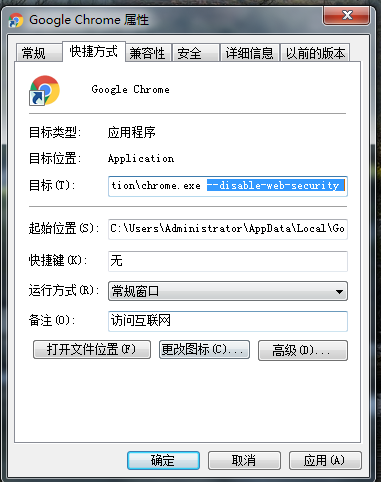Home >Web Front-end >JS Tutorial >The perfect solution to NODE.JS cross-domain problems
The perfect solution to NODE.JS cross-domain problems
- 高洛峰Original
- 2017-02-04 10:25:441521browse
In the past few days, when a company colleague (front-end) wrote a page, he kept saying that he couldn't get the JSON he wanted. It is available on Android and iOS, but he is also a newbie and doesn't know why. He only knows that it is a js cross-domain problem. , and then asked me that I didn’t understand the front-end, so I started Baidu.
Some people said that Google Chrome needs to be set up cross-domain, and then I added a --disable-web-security after the target of Google Chrome.

#But later I found that an error was still reported and the desired data was still not available. Later, I kept looking around and found nothing.
Until today, I was inspired by the cross-domain problem of PHP on Baidu, so Baidu found the cross-domain problem of node.js. Finally, I added a cross-domain code in the app.js routing settings to perfectly solve the problem:
var express = require('express');
var app = express();
//设置跨域访问
app.all('*', function(req, res, next) {
res.header("Access-Control-Allow-Origin", "*");
res.header("Access-Control-Allow-Headers", "X-Requested-With");
res.header("Access-Control-Allow-Methods","PUT,POST,GET,DELETE,OPTIONS");
res.header("X-Powered-By",' 3.2.1');
res.header("Content-Type", "application/json;charset=utf-8");
next();
});
//app.listen(8088);
The above is the perfect solution to the NODE.JS cross-domain problem introduced by the editor. I hope it will be helpful to you. If you have any questions, please leave me a message. , the editor will reply to everyone in time. I would also like to thank you all for your support of the PHP Chinese website!
For more articles related to the perfect solution to NODE.JS cross-domain problems, please pay attention to the PHP Chinese website!
Related articles
See more- An in-depth analysis of the Bootstrap list group component
- Detailed explanation of JavaScript function currying
- Complete example of JS password generation and strength detection (with demo source code download)
- Angularjs integrates WeChat UI (weui)
- How to quickly switch between Traditional Chinese and Simplified Chinese with JavaScript and the trick for websites to support switching between Simplified and Traditional Chinese_javascript skills

